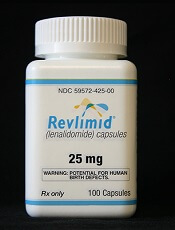
Photo courtesy of Celgene
Initial results from the phase 3 REMARC study suggest that lenalidomide (Revlimid) maintenance does not prolong overall survival (OS) in patients with diffuse large B-cell lymphoma (DLBCL) who have responded to first-line treatment with R-CHOP.
Based on these results, Celgene Corporation, the company developing lenalidomide, said it does not plan to seek approval for the drug for this indication.
REMARC is a randomized, double-blind study designed to compare lenalidomide maintenance to placebo in 650 patients responding to induction therapy with R-CHOP (rituximab, cyclophosphamide, doxorubicin, vincristine, and prednisone).
Patients in REMARC had received 6 to 8 cycles of the R-CHOP-14 regimen, 6 to 8 cycles of the R-CHOP-21 regimen, or 6 cycles of R-CHOP-14/R-CHOP-21 completed by 2 cycles of rituximab alone.
The primary endpoint of the study—a significant improvement in progression-free survival for patients receiving lenalidomide—was met.
However, the interim analysis of OS showed no benefit for patients in the lenalidomide arm.
Celgene said that, based on these results, the company is not planning to seek approval for lenalidomide as maintenance in this patient population.
“We are continuing to partner with LYSA [Lymphoma Study Association] to complete the analyses of the REMARC study,” said Michael Pehl, of Celgene.
“We remain committed to finishing the 4 ongoing phase 3 trials evaluating Revlimid and are confident about its potential as a treatment option across different settings in lymphoma.”
The REMARC study is part of a research program focused on non-Hodgkin lymphoma. In addition to the REMARC study, lenalidomide is also being evaluated in:
- The RELEVANCE study—in combination with rituximab in previously untreated follicular lymphoma (FL)
- The AUGMENT study—in combination with rituximab in relapsed/refractory FL and marginal zone lymphoma
- The MAGNIFY study—in combination with rituximab in relapsed/refractory FL, marginal zone lymphoma, and mantle cell lymphoma
- The ROBUST study—in combination with R-CHOP in previously untreated ABC-subtype DLBCL.
Data from RELEVANCE and AUGMENT are expected in the first and second half of 2017, respectively.

